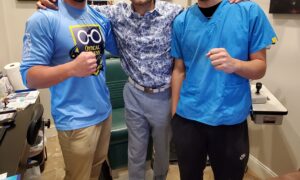By Diane Palombi, OD
March 16, 2016
Recently a friend showed me her new distance glasses. Then she asked me if there was a reason why her doctor hadn’t given her the option of LASIK or contact lenses. A few days later another friend inquired about spectacle lens options. A third friend was recently referred to a retinal specialist. He had questions about his condition.
I am beginning to wonder whether busy doctors are not explaining things well to their patients. Patients are leaving their exams with not all of their questions answered, rather than being shown the range of options they have.
In fact, taking the time to explain new and exciting options for vision correction is part of providing the best patient care. As it happens, it also is integral to practice growth, because it offers your patients premium-priced optical solutions, and creates opportunities to communicate the value and uniqueness of your goods and services. In other words, being expedient in your patient interactions because you a “so busy” is a sure way to be “less busy” in the future.
In the case of the new distance glasses wearer, I could understand why the doctor did not bring up alternatives to glasses. The patient was in her early 60s and had worn reading glasses for years. Her hyperopia had now progressed to the point where the television was a bit fuzzy. She would need to be fitted with monovision or multifocal lenses. Contacts would most likely be more work than help. Her prescription was too weak for refractive surgery. Glasses that were worn for certain tasks were the easy fix for her current needs. After I explained her situation to her, my friend was comfortable with wearing glasses when she needed them. However, we all have had the motivated patient who is willing to try contacts when they may not be the ideal candidate for wearing them.
Patients like to hear and understand their options. After all, they best understand their lifestyle. There may be a job, or sports activities, where wearing contacts, or having refractive surgery, may be their best option. It may even keep them safer.
The friend inquiring about lens options basically wanted a doctor’s opinion. She felt that opticians can be motivated by selling expensive lens options in order to earn perks or bonuses. An unbiased opinion of lens treatments was what she was interested in. Again, we doctors are busy. It is very easy to have your optical staff handle all of the frame and lens questions. Yet it only takes a few minutes of our time to explain why Transitions may not make the best driving glasses, or why your boating patient might like polarized sunglasses. Your opinion carries a lot of weight with your patients.
As far as medical consults are concerned, sometimes we don’t want to stick our necks out, especially if we are not 100 percent certain of our diagnoses. We would rather let the specialist do the necessary test and then hopefully confirm our suspicions. No one likes to give a patient bad news. Optometrists have the option of letting the ophthalmologist be the bad guy. I do not believe in worrying a patient unnecessarily, but giving too little information can be as bad as giving too much. People tend to think the worst when they need to see another doctor. You need to communicate that it is a tentative diagnosis. You are being cautious.
Even with relatively safe procedures like cataract surgery, I would pull out my plastic model eyeball to explain what was going on and how the procedure is performed. Sure, the ophthalmologist is going to give them the same information, but the more your patient hears something, the more likely they are going to understand it and be comfortable with it. I am a big believer in handouts that the patient can take home about their possible condition. Visual aids can be extremely helpful. I had an optical aid that illustrated how glaucoma progressed and another that showed how different eye conditions, like glaucoma or diabetes, could affect vision. A verbal explanation alone can be overwhelming at times. Seeing examples can greatly improve doctor-patient communication.
I think that I must have explained astigmatism a million times when I was in practice. Patients even confused near and farsightedness. It may seem basic to us, but it is not to our patients. I always made a point at the end of my exam to ask if my patient had any questions.
There is not one question that is too trivial to be brushed off. An educated patient is a happy patient. A happy patient keeps returning to your office.
How do you ensure all of your patients’ questions are answered, and that you have fully educated them about their eye health and visual needs?
Diane Palombi, OD, now retired,owned Palombi Vision Center in Wentzville, Mo. To contact her: dlpod1@hotmail.com























